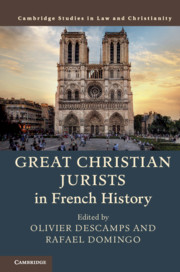Book contents
- Great Christian Jurists in French History
- Law and Christianity
- Great Christian Jurists in French History
- Copyright page
- Dedication
- Contents
- Contributors
- Acknowledgments
- Introduction
- 1 Ivo of Chartres (Yves de Chartres)
- 2 Stephen of Tournai (Étienne de Tournai)
- 3 Guillaume Durand
- 4 Jacques de Revigny
- 5 Pierre de Belleperche
- 6 Charles Dumoulin
- 7 John Calvin
- 8 Jacques Cujas
- 9 François Hotman
- 10 Hugues Doneau
- 11 Jean Bodin
- 12 Jean Domat
- 13 Henri François d’Aguesseau
- 14 Robert-Joseph Pothier
- 15 Jean-Étienne-Marie Portalis
- 16 Alexis de Tocqueville
- 17 Paul Viollet
- 18 Paul Fournier
- 19 Raymond Saleilles
- 20 Maurice Hauriou
- 21 Léon Duguit
- 22 Georges Ripert
- 23 Jacques Maritain
- 24 Robert Schuman
- 25 Gabriel Le Bras
- 26 Jean Carbonnier
- 27 Michel Villey
- Index
- References
26 - Jean Carbonnier
(1908–2003)
Published online by Cambridge University Press: 10 May 2019
- Great Christian Jurists in French History
- Law and Christianity
- Great Christian Jurists in French History
- Copyright page
- Dedication
- Contents
- Contributors
- Acknowledgments
- Introduction
- 1 Ivo of Chartres (Yves de Chartres)
- 2 Stephen of Tournai (Étienne de Tournai)
- 3 Guillaume Durand
- 4 Jacques de Revigny
- 5 Pierre de Belleperche
- 6 Charles Dumoulin
- 7 John Calvin
- 8 Jacques Cujas
- 9 François Hotman
- 10 Hugues Doneau
- 11 Jean Bodin
- 12 Jean Domat
- 13 Henri François d’Aguesseau
- 14 Robert-Joseph Pothier
- 15 Jean-Étienne-Marie Portalis
- 16 Alexis de Tocqueville
- 17 Paul Viollet
- 18 Paul Fournier
- 19 Raymond Saleilles
- 20 Maurice Hauriou
- 21 Léon Duguit
- 22 Georges Ripert
- 23 Jacques Maritain
- 24 Robert Schuman
- 25 Gabriel Le Bras
- 26 Jean Carbonnier
- 27 Michel Villey
- Index
- References
Summary
- Type
- Chapter
- Information
- Great Christian Jurists in French History , pp. 433 - 446Publisher: Cambridge University PressPrint publication year: 2019

